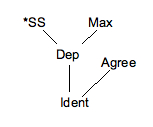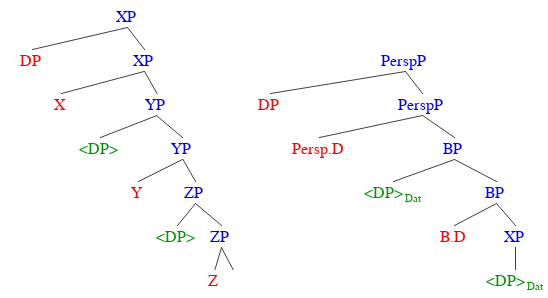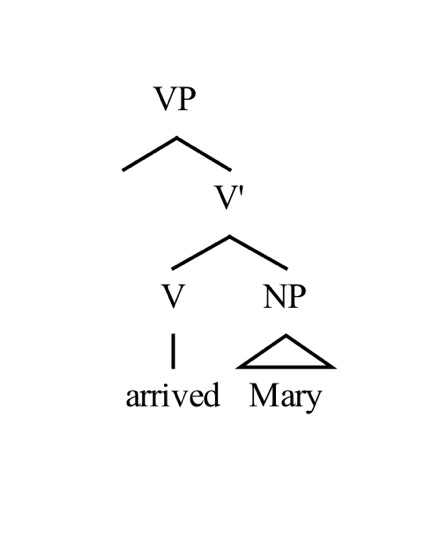|
Burzio's Generalization
In generative linguistics, Burzio's generalization is the observation that a verb can assign a theta role to its subject position if and only if it can assign an accusative case to its object. Accordingly, if a verb does not assign a theta role to its subject, then it does not assign accusative case to its object. The generalization is named after Italian linguist Luigi Burzio, based on work published in the 1980s, but the seeds of the idea are found in earlier scholarship. The generalization can be logically written in the following equation: θ ↔ A Where: θ = Subject Theta Role A = Accusative Case Burzio’s generalization has two major consequences: # Burzio's generalization recognizes two classes of intransitive verbs. With unaccusative intransitive verbs (e.g., ''fall''), the single argument bears the theme theta role, and the subject is understood as the undergoer of the action. For exa ... [...More Info...] [...Related Items...] OR: [Wikipedia] [Google] [Baidu] |
Verb
A verb () is a word ( part of speech) that in syntax generally conveys an action (''bring'', ''read'', ''walk'', ''run'', ''learn''), an occurrence (''happen'', ''become''), or a state of being (''be'', ''exist'', ''stand''). In the usual description of English, the basic form, with or without the particle ''to'', is the infinitive. In many languages, verbs are inflected (modified in form) to encode tense, aspect, mood, and voice. A verb may also agree with the person, gender or number of some of its arguments, such as its subject, or object. Verbs have tenses: present, to indicate that an action is being carried out; past, to indicate that an action has been done; future, to indicate that an action will be done. For some examples: * I ''washed'' the car yesterday. * The dog ''ate'' my homework. * John ''studies'' English and French. * Lucy ''enjoys'' listening to music. *Barack Obama ''became'' the President of the United States in 2009. ''(occurrence)'' *Mike Trout ... [...More Info...] [...Related Items...] OR: [Wikipedia] [Google] [Baidu] |
Theta Role
In generative grammar, a theta role or θ-role is the formal device for representing syntactic argument structure—the number and type of noun phrases—required syntactically by a particular verb. For example, the verb ''put'' requires three arguments (i.e., it is trivalent). The formal mechanism for implementing a verb's argument structure is codified as theta roles. The verb ''put'' is said to "assign" three theta roles. This is coded in a theta grid associated with the lexical entry for the verb. The correspondence between the theta grid and the actual sentence is accomplished by means of a bijective filter on the grammar known as the theta criterion. Early conceptions of theta roles include (Fillmore called theta roles "cases") and . Theta roles are prominent in government and binding theory and the standard theory of transformational grammar. Thematic relations The term "theta role" is often used interchangeably with the term thematic relations (particularly in main ... [...More Info...] [...Related Items...] OR: [Wikipedia] [Google] [Baidu] |
Optimality Theory
In linguistics, Optimality Theory (frequently abbreviated OT) is a linguistic model proposing that the observed forms of language arise from the optimal satisfaction of conflicting constraints. OT differs from other approaches to phonological analysis, such as autosegmental phonology and linear phonology (SPE), which typically use rules rather than constraints. OT models grammars as systems that provide mappings from inputs to outputs; typically, the inputs are conceived of as underlying representations, and the outputs as their surface realizations. It is an approach within the larger framework of generative grammar. In linguistics, Optimality Theory has its origin in a talk given by Alan Prince and Paul Smolensky in 1991 which was later developed in a book manuscript by the same authors in 1993. Overview There are three basic components of the theory: * Generator () takes an input, and generates the list of possible outputs, or candidates, * Constraint component () provi ... [...More Info...] [...Related Items...] OR: [Wikipedia] [Google] [Baidu] |
Unaccusative Verbs
In linguistics, an unaccusative verb is an intransitive verb whose grammatical subject is not a semantic agent. In other words, the subject does not actively initiate, or is not actively responsible for, the action expressed by the verb. An unaccusative verb's subject is semantically similar to the direct object of a transitive verb or to the subject of a verb in the passive voice. Examples in English are "the tree ''fell''"; "the window ''broke''". In those sentences, the action (falling, breaking) can be considered as something that happened to the subject, rather than being initiated by it. Semantically, the word "tree" in the sentence "the tree fell" plays a similar role as it does in a transitive sentence, such as "they cut down the tree", or its passive transformation "the tree was cut down". Unaccusative verbs thus contrast with unergative verbs, such as ''run'' or ''resign'', which describe actions voluntarily initiated by the subject. They are called ''unaccusative'' becau ... [...More Info...] [...Related Items...] OR: [Wikipedia] [Google] [Baidu] |
Ergative Case
In grammar, the ergative case (abbreviated ) is the grammatical case that identifies the noun as the agent of a transitive verb in ergative–absolutive languages. Characteristics In such languages, the ergative case is typically marked (most salient), while the absolutive case is unmarked. Recent work in case theory has vigorously supported the idea that the ergative case identifies the agent (the intentful performer of an action) of a verb (Woolford 2004). In Kalaallisut (Greenlandic) for example, the ergative case is used to mark subjects of transitive verbs and possessors of nouns. This syncretism with the genitive is commonly referred to as the ''relative'' case. Nez Perce has a three-way nominal case system with both ergative (''-nim'') and accusative (''-ne'') plus an absolute (unmarked) case for intransitive subjects: ''hipáayna qíiwn'' ‘the old man arrived’; ''hipáayna wewúkiye'' ‘the elk arrived’; ''wewúkiyene péexne qíiwnim'' ‘the old man saw ... [...More Info...] [...Related Items...] OR: [Wikipedia] [Google] [Baidu] |
Quirky Case
In linguistics, quirky subjects (also called oblique subjects) are a phenomenon where certain verbs specify that their subjects are to be in a case other than the nominative. These non-nominative subjects are determiner phrases that pass subjecthood tests such as subject-oriented anaphora binding, PRO control, reduced relative clause, conjunction reduction,Poole, Ethan (2014)Deconstructing quirky subjects University of Massachusetts Amherst. North East Linguistic Society 45. subject-to-subject raising, and subject-to-object raising.Pankau, Andreas (2016)Quirky subjects in Icelandic, Faroese, and German: a relational account Presentation at the Joint 2016 Conference on HPSG and LFG, Polish Academy of Sciences, Warsaw, Poland. It has been observed cross-linguistically that the subject of a sentence often has a nominative case. However, this one-to-one relationship between case and grammatical relations (subjecthood) is highly debatable. Some argue that nominative case marking and co ... [...More Info...] [...Related Items...] OR: [Wikipedia] [Google] [Baidu] |
The Vase Fell, Tree Structure
''The'' () is a grammatical article in English, denoting persons or things that are already or about to be mentioned, under discussion, implied or otherwise presumed familiar to listeners, readers, or speakers. It is the definite article in English. ''The'' is the most frequently used word in the English language; studies and analyses of texts have found it to account for seven percent of all printed English-language words. It is derived from gendered articles in Old English which combined in Middle English and now has a single form used with nouns of any gender. The word can be used with both singular and plural nouns, and with a noun that starts with any letter. This is different from many other languages, which have different forms of the definite article for different genders or numbers. Pronunciation In most dialects, "the" is pronounced as (with the voiced dental fricative followed by a schwa) when followed by a consonant sound, and as (homophone of the archaic ... [...More Info...] [...Related Items...] OR: [Wikipedia] [Google] [Baidu] |
Extended Projection Principle
The extended projection principle (EPP) is a linguistic hypothesis about subjects. It was proposed by Noam Chomsky as an addendum to the projection principle. The basic idea of the EPP is that clauses must contain a noun phrase or determiner phrase in the subject position (i.e. in the specifier of a tense phrase or inflectional phrase or in the specifier of a verb phrase in languages in which subjects don't raise to TP/IP, e.g. Welsh). Details Most verbs require meaningful subjects—for example, "kick" in "Tom kicked the ball" takes the subject "Tom". However, other verbs do not require (and in fact, do not permit) meaningful subjects—for example, one can say "it rains" but not "the sky rains". The EPP states that regardless of whether the main predicate assigns a meaningful theta role to a subject, a subject must be present syntactically. As a result, verbs that do not assign external theta roles will appear with subjects that are either dummy pronoun A dummy pronoun ... [...More Info...] [...Related Items...] OR: [Wikipedia] [Google] [Baidu] |
Idiom
An idiom is a phrase or expression that typically presents a figurative, non-literal meaning attached to the phrase; but some phrases become figurative idioms while retaining the literal meaning of the phrase. Categorized as formulaic language, an idiom's figurative meaning is different from the literal meaning. Idioms occur frequently in all languages; in English alone there are an estimated twenty-five million idiomatic expressions. Derivations Many idiomatic expressions were meant literally in their original use, but sometimes the attribution of the literal meaning changed and the phrase itself grew away from its original roots—typically leading to a folk etymology. For instance, the phrase "spill the beans" (meaning to reveal a secret) is first attested in 1919, but has been said to originate from an ancient method of voting by depositing beans in jars, which could be spilled, prematurely revealing the results. Other idioms are deliberately figurative. For example, " brea ... [...More Info...] [...Related Items...] OR: [Wikipedia] [Google] [Baidu] |
Theta Criterion
The theta-criterion (also named θ-criterion) is a constraint on x-bar theory that was first proposed by as a rule within the system of principles of the government and binding theory, called theta-theory (θ-theory). As theta-theory is concerned with the distribution and assignment of theta-roles (a.k.a. thematic roles), the theta-criterion describes the specific match between arguments and theta-roles (θ-roles) in logical form (LF): Being a constraint on x-bar theory, the criterion aims to parse out ill-formed sentences. Thus, if the number or categories of arguments in a sentence does not meet the theta-role assigner's requirement in any given sentence, that sentence will be deemed ungrammatical. . In other words, theta-criterion sorts sentences into grammatical and ungrammatical bins based on c-selection and s-selection. Applied Theta grid A theta-role is a status of thematic relation . In other words, a theta-role describes the connection of meaning between a ... [...More Info...] [...Related Items...] OR: [Wikipedia] [Google] [Baidu] |





.png)

